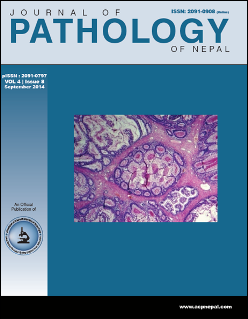Lupus nephritis: Update on aetiopathogenesis and controversies in classification
DOI:
https://doi.org/10.3126/jpn.v4i8.11596Keywords:
Kidney, Immune complex, Systemic lupus erythematosusAbstract
Systemic Lupus Erythematosus; a chronic autoimmune disease; is characterized by loss of tolerance against its own antigens and leads to production of autoantibodies and causes formation and deposition of immune complexes in different organs. Recent articles have been trying to unravel the mysteries of SLE. Different theories that have been proposed for the aetiopathogenesis of SLE are a)The circulating immune complex theory, b) The direct binding to endogenous renal antigens theory, and c) binding of antibody to antigens that were previously ‘planted’ into the kidney.
DOI: http://dx.doi.org/10.3126/jpn.v4i8.11596
Journal of Pathology of Nepal; Vol.4,No. 8 (2014) 672-676
Downloads
Downloads
Published
How to Cite
Issue
Section
License
This license enables reusers to distribute, remix, adapt, and build upon the material in any medium or format, so long as attribution is given to the creator. The license allows for commercial use.




